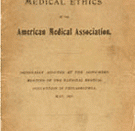Medical Ethics and Autonomy
Autonomy is one of the most central values in the United States particularly when it comes to health care. The focus is on respecting the capacity of an individual to make his or her own health care decisions. There are some instances in which society tries to limit a person's ability to make decisions about his or her own health care.
Religion is often a reason for society trying to infringe upon one's right to choose. An example of this is with the Jehovah's Witness religion. The Witness religion has been an ongoing dilemma for many years. When it comes to receiving blood, or a blood born agent, they refuse the treatment regardless of the circumstances. The Jehovah's Witness believe that the blood will poison their bodies from purity, this in turn would prevent them from going to heaven. A Jehovah's Witness may often consent to other forms of treatment to preserve life.
A Witness will also sign a consent, which directs the medical provider to not administer blood under ay circumstances.
Often, the refusal of blood transfusions can result in the need for intensive care. Such additional treatment can also lead to more expensive treatment, a longer hospital stay, or could even result in the death of the patient. Despite these potential dangers health care providers need to respect the patients decision as long as it is coming from an alert and autonomous adult.
There have been a number of cases presented to the court system over the refusal of blood treatment. The question we must ask is can the court system or even a physician paternalistically know what risks are in the best interest of the patient? Since every case is different an all people could potentially respond to the same treatment in different...



A little bit of opinion to add to the facts.
This is all very true about the debate and I feel that life is good and should be maintained at all costs AS LONG AS IT IS MAINTAINED WILLINGLY. If the person wishes to die you can greive but don't just make them keep on living if they don't want to. I read in a newspaper a while back about a patient who requested not to be kept alive, but the doctors didn't listen. He was healed then a week after he was released he commited suicide. But all in all it was a very good essay.
3 out of 3 people found this comment useful.